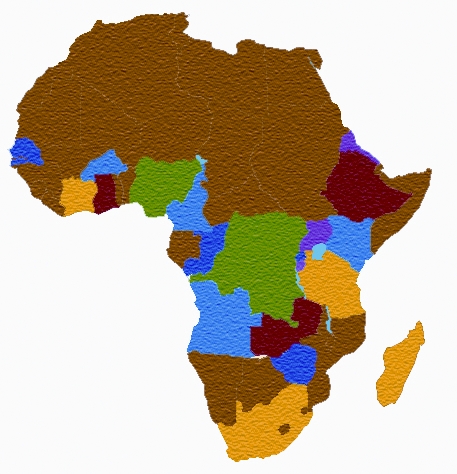‘Africa’ In Cubao
By Sr Emma de Guzman ICM
After 30 years in Cameroon, Sister Emma is now working at home in the Philippines.
To the beat of drums, shouts of joy, clapping of hands and swaying dances, we celebrated an African Mass on Sunday, 27 February. Everything was African except the place - Holy Spirit School, Ilang-Ilang Road, Cubao,Quezon City.
‘We love you, Africa’ was printed in bold letters in the auditorium where the event took place. Below was written‘Welcome to all Africans and friends of Africa. Tayo ay magdiwang at magsaya.’ The pagdiriwang and pagsasayabegan with registration as participants started arriving at 9:30am.
Mini-United Nations
Old acquaintances embraced and greeted each other in English, French, Twi, Kikongo, Lingala, Swahili, Pidgin and other African languages. I was literally transported to Africa. Many ladies wore their beautiful and colorful traditional attire. More than African, the participants were international. It was like a mini-United Nations encounter. African countries represented were: Angola, Burkina Faso, Burundi, Cameroon, Congo (Congo-Brazzaville), Congo Democratic Republic (Congo-Kinshasa), Eritrea, Ethiopia, Ghana, Ivory Coast, Kenya, Madagascar, Nigeria, Rwanda, Senegal, South Africa, Uganda, Tanzania, Zambia and Zimbabwe. There were also friends from Brazil, Haiti, Irela nd,Mexico, and many Filipinos.
Religious from all around
Religious present included Xaverians, Holy Spirit Sisters, ICM Sisters, Mercy Sisters, Daughters of Charity, SVD’s, Mercedarians, Conceptionists, Claretians, Scalabrinians, CICMs, among others. I was overwhelmed at the number of CICM confreres and Cameroonian theology students at MST (Maryhill School of Theology) whom I had known in Cameroon.
The well-prepared Mass booklet had a map of Africa on the cover and the words ‘African Gathering.’ The songs were in French, Lingala, Tagalog, English and Swahili. The Eucharistic celebration began with a ritual, a short drama of a typical welcome in the African way: ‘Feel at home, welcome!!!’ Then a group danced the processional. Fr. Francis N’sapo Kande CICM, from Congo-Kinshasa, was the main celebrant. Concelebrants were Filipino missionaries who have worked in Africa: Fr Efren de Guzman SVD, Angola, Fr Carlos Lariosa SVD and Fr Dionisio Nellas SVD, Ghana and Fr Peter Casiño OSA, Tanzania.
Before the Gospel reading, the Bible was brought in, beautifully adorned on a palanquin and carried on the shoulders by two participants. They danced to the beat of the drums and the singing of the assembly. This was no ordinary Sunday Mass. Everyone was clapping their hands. No one can resist swaying to African rhythms. We sat down during the reading of the Gospel, the custom in Ivory Coastand some other African countries. The homily of Fr Dionisio Nellas centered on the theme of the African synod: Church, Family of God. He underlined African values. This was also the objective of the gathering: to strengthen fraternity, unity, moral support and encouragement of one another.
Highlights of the Mass included the processional dance at the offertory, and the giving of the sign of peace: warm hugs, embraces and handshakes. We had to forego the less exuberant Filipino smile.
African-Filipino Dishes
After Mass, we sat in a circle for the blessing of the agape. To everyone’s delight, the food was typical African and Filipino dishes. A program and dancing followed until past 5 pm.
The program included sharing experiences in small groups. Additional highlights were dramas of a marriage in Kenya, and a naming ceremony in Ghana, by Ghanaians, Cameroonians, Kenyans, Ivorians and Tanzanians.
The exchange of addresses and warm goodbyes after an afternoon of dancing were not easy. One felt that the celebration should go on. In my enthusiasm, I asked when the next African Encounter would be. Sr Mercy Benson SSpS, a Ghanaian member of the coordinating committee, answered me in Tagalog: ‘Isang beses lang po sa isang taon,’ ‘Once a year.’ I couldn’t help asking ‘Why?’ ‘It’s not easy to gather them all coming from the different islands of the Philippines.’
‘We love Africa’ is indeed a fitting theme. This was the logo printed on the T-shirts and badges given to those present. On the back of the T-shirts was printed: ‘Our Motherland forever.’
A Cameroonian acquaintance, Anicet, offered me his badge. I asked why he was giving his souvenir of the day to me. He answered: ‘I know you’ve left your heart in Cameroon.’ I thanked him with a hug exclaiming, ‘WE LOVE AFRICA.’
Whoever said the world has forgotten place Africa wasn’t with us in ‘Africa,’ Cubao!
You may contact Sister Emma at emma41545@yahoo.fr
